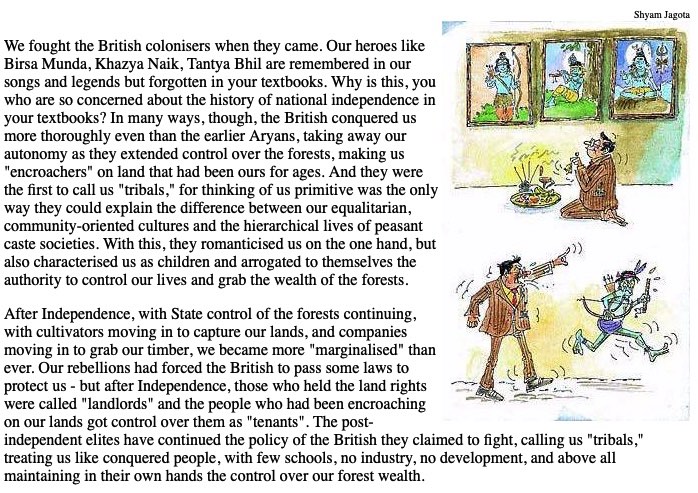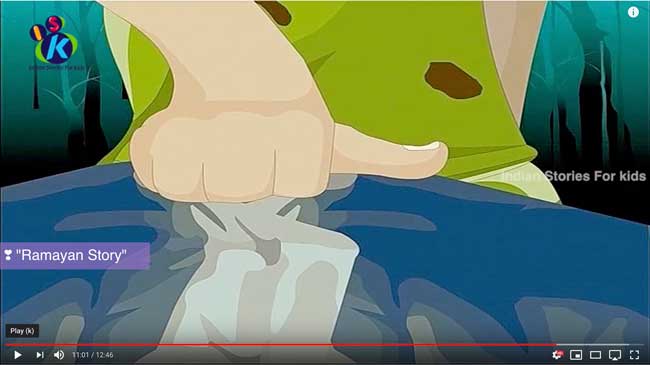
“We have to write our own stories, about our issues, from our own perspectives.” – Abhay Xaxa, a “Fiercely Unapologetic Adivasi Scholar-Activist” | Read more >>
Call us adivasis, please
If Adivasis were to start writing their own Discovery Of India, it would be something like this: There are those who talk of India’s “5000 year-old culture,” there are those who talk of its “timeless traditions.” If India has a timeless tradition, it is ours. The cultures running back for tens of thousands of years are the cultures of the many Adivasi communities in the subcontinent. We are Bhils, Gonds, Oraons, Mundas, Hos, Santals, Korkus and Irulas, the large and small groups of people who live today in the hilly areas of the country and are scattered across its central belt, we who have kept ourselves apart from feudal States and Brahmanic hierarchies for thousands of years, we who have resisted hierarchy and maintained our ancient collectivities and ways of life. […]
We were here before the Aryans came thundering in their chariots through the mountain passes; they could break the dams, flooding the plains and destroying the remnants of the Indus cities but they could not destroy us. They knew us as Nishada and Naga; they called us Rakshasa, they burned the forests to destroy us and free the land to fashion their agrarian society stamped with the hierarchy of caste. They were the ones who remembered us as their enemies. Ekalavya was one of our great archers, so skillful that the hero of the Aryans, Arjun, could not stand before him. But they assaulted him, cutting his thumb, destroying his ability to fight – and then fashioned a story in which he accepted Drona as his Guru and agreed to surrender his thumb! […]
We were here before the founders of that Meluhha known to far-off Mesopotamia built their cities on the plains of the Indus. Before Mohenjo-daro and Harappa and Lothal, before drains were laid out, before seals began to be stamped and goods traded and granaries made, we lived off the forests, gathering the abundant food we found, sometimes burning down the trees for planting but always moving on to let the forest regenerate. We traded occasionally with the Indus cities, but we remained free; they never conquered us or tried to conquer us. […]
We want a development that will preserve the best parts of our culture, our sense of community and collectivity, our equalitarian life, our freedom. We do not believe that should be so difficult in the world today, but you seem to be following a different path. And finally, why not drop such senseless terms such as “Scheduled Tribe” and “anusuchit jamati” in the Constitution also and call us by our proper name, “Adivasis”?
The author is a consulting sociologist, based in Kasegaon.
Gail Omvedt, The Hindu [Folio], ADIVASI, Special issue with the Sunday Magazine, July 16, 2000 | Read the full issues and other articles here >>

Reports in the Indian press | List of periodicals included in this search >>
Search tips
Combine the name of any particular state, language or region with that of any tribal (Adivasi) community.
Add keywords of special interest (music, poetry, dance just as health, sacred grove and biodiversity); learn about the rights of Scheduled Tribes such as the “Forest Rights Act” (FRA); and the United Nations “Declaration on the Rights of Indigenous Peoples”, “Universal Declaration of Human Rights”, “women’s rights”, or “children’s right to education”.
Ask a question that includes “tribal” or “Adivasi”, for instance: “Adivasi way of life better?” (or “tribal way of life worse?”)
Specify any particular issue or news item (biodiversity, bonded labour and human trafficking, climate change, ecology, economic development, ethnobotany, ethnomedicine, global warming, hunter-gatherers in a particular region or state, prevention of rural poverty, water access).
For official figures include “scheduled tribe ST” along with a union state or region: e.g. “Chhattisgarh ST community”, “Himalayan tribe”, “Scheduled tribe Tamil Nadu census”, “ST Kerala census”, “Particularly Vulnerable Tribal Group Jharkhand”, “PVTG Rajasthan”, “Adivasi ST Kerala”, “Adibasi ST West Bengal” etc.
In case the Google Custom Search window is not displayed here try the following: (1) toggle between “Reader” and regular viewing; (2) in your browser’s Security settings select “Enable JavaScript” | More tips >>
Note: hyperlinks and quotes are meant for fact-checking and information purposes only | Disclaimer >>
Learn more
Anthropology | Irish Journal of Anthropology | Folio Special issue
Colonial policies | History | Indus Valley | Mohenjo Daro
eBooks, eJournals & reports | eLearning
eBook | Background guide for education
Ekalavya (Eklavya)
Forest Rights Act (FRA) | Hunter-gatherers | Nishad (Nishada, Sanskrit Niṣāda, “tribal, hunter, mountaineer, degraded person outcast”) | Vanavasi (Vanvasi, Vanyajati)
India’s Constitutional obligation to respect their cultural traditions
Jawaharlal Nehru’s “five principles” for the policy to be pursued vis-a-vis the tribals
Particularly vulnerable tribal group (PVTG)
Rabindranath Tagore: a universal voice – Unesco
Remembering Birsa Munda: The charismatic tribal leader who shook the British Empire – Jharkhand
Scheduled Tribes | Classifications in different states
Video | Adivasi Academy & Museum of Adivasi Voice at Tejgadh – Gujarat
Video | Tribes in Transition-III: “Indigenous Cultures in the Digital Era”
What is the Forest Rights Act about?
Who is a forest dweller under this law, and who gets rights?
